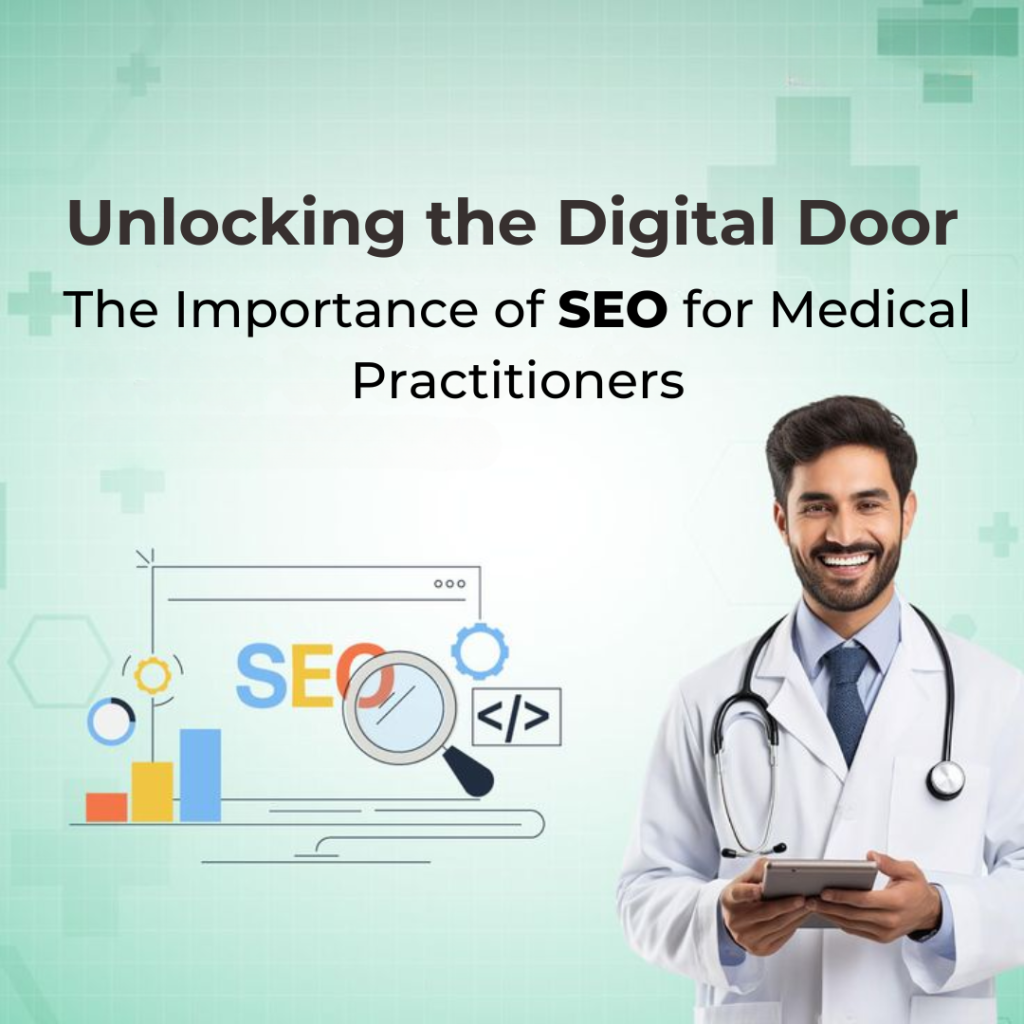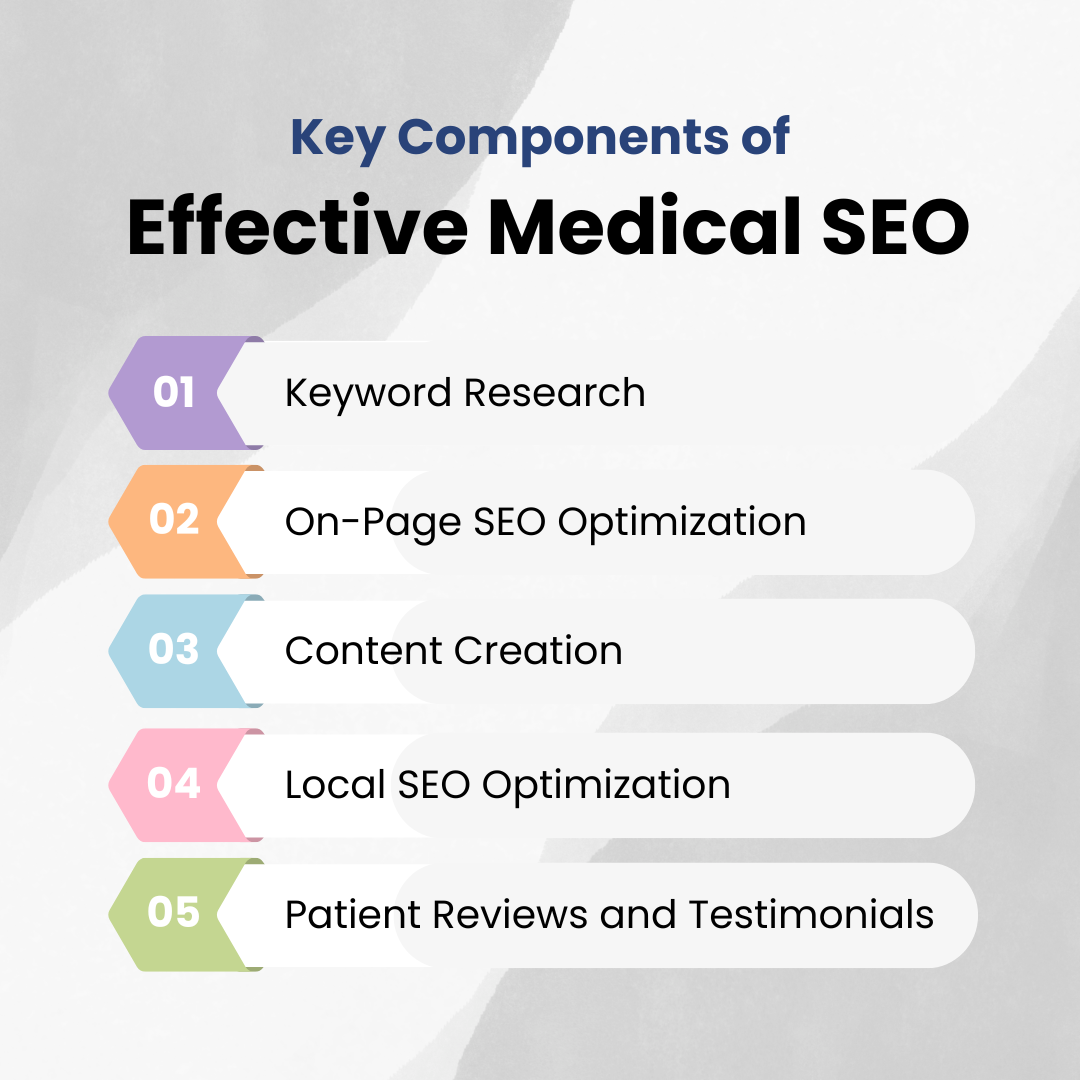
Medical SEO marketing has become crucial for the success of medical practitioners to increase their online visibility. With more patients turning to the internet to find healthcare services, having a robust digital presence is important.
Importance of SEO for Medical Practice
One of the most effective ways to enhance online visibility is through SEO for medical practice. This blog explores why SEO for medical is vital for practitioners and how it can unlock new opportunities for growth and patient engagement.
The Growing Importance of Medical Website SEO
The healthcare sector is highly competitive. Patients have access to a multitude of options, making it imperative for medical practitioners to stand out. Medical SEO helps bridge the gap between your practice and potential patients by improving your website’s visibility in search engine results. Here’s why medical website SEO is crucial for your practice:
1. Enhanced Visibility and Increased Traffic
Medical SEO marketing focuses on making your practice more visible to those who are actively searching for healthcare services. By ranking higher in search engine results, your website gains more exposure, leading to increased organic traffic.
When potential patients search for medical services, they are more likely to choose practices that appear at the top of search results. This heightened visibility can translate to more patient inquiries and appointments.
2. Building Trust and Authority
A strong SEO strategy can help establish your practice as a trusted authority in your field. Medical SEO involves optimizing your website to reflect your expertise and credibility.
When your practice appears at the top of search results, it signals to potential patients that you are a leading figure in your specialty. High-quality content, patient reviews, and an optimized website contribute to building trust and establishing authority, making patients more likely to choose your services.
3. Targeted Patient Acquisition
Effective SEO is not just about driving traffic to your website but also about attracting the right kind of traffic. SEO for medical allows you to target specific keywords that are relevant to your practice. By focusing on keywords that potential patients use to search for medical services, you can reach a more targeted audience.
This targeted approach ensures that the visitors to your site are actively seeking the services you offer, resulting in higher conversion rates and more meaningful patient interactions.
Key Components of Effective Medical SEO

1. Keyword Research
Keyword research is the foundation of medical SEO marketing. Identifying the right keywords is crucial for attracting relevant traffic. Start by researching keywords that potential patients are likely to use when searching for medical services.
Tools like Google Keyword Planner and SEMrush can help you discover high-traffic keywords and analyze their competition. Focus on both broad and long-tail keywords to cover a wide range of search queries related to your specialty.
2. On-Page SEO Optimization
Medical SEO involves optimizing various elements of your website to improve its search engine ranking. This includes:
-
- Title Tags and Meta Descriptions: Ensure that these elements are descriptive and include relevant keywords. They should accurately reflect the content of your pages and encourage users to click through to your site.
-
- Headers and Subheaders: Use headers (H1, H2, H3) to structure your content and make it easier for both users and search engines to understand. Include relevant keywords in these headers to improve SEO.
-
- Content Optimization: Create high-quality, informative content that addresses common patient concerns and questions. Incorporate keywords naturally into your content and avoid keyword stuffing.
-
- Internal Linking: Use internal links to connect related content on your website. This helps search engines understand the structure of your site and improves user navigation.
-
- Mobile Responsiveness: Ensure that your website is mobile-friendly. With a growing number of users accessing websites from mobile devices, a responsive design is essential for both user experience and SEO.
3. Content Creation
Creating valuable and informative content is a crucial aspect of SEO medical marketing. Regularly updated content, such as blog posts, articles, and FAQs, can drive traffic to your site and enhance your practice’s authority.
Focus on creating content that answers common patient questions, provides educational information, and showcases your expertise. Engaging content can also encourage visitors to spend more time on your site, which positively impacts your search engine ranking.
4. Local SEO Optimization
For medical practitioners, local SEO is especially important. SEO for medical includes optimizing your practice’s local presence to attract patients in your area. Key strategies include:
-
- Google My Business (GMB): Claim and optimize your GMB listing to ensure that your practice appears in local search results and Google Maps. Provide accurate information about your location, hours of operation, and services.
-
- Local Citations: Ensure that your practice is listed on local directories and review sites. Consistent NAP (Name, Address, Phone number) information across these platforms helps improve local search rankings.
-
- Local Backlinks: Acquire backlinks from reputable local websites and organizations. These links can enhance your practice’s local authority and improve your search engine ranking.
5. Patient Reviews and Testimonials
Positive patient reviews and testimonials can significantly impact your SEO efforts. Encourage satisfied patients to leave reviews on Google, Yelp, and other review platforms.
Medical SEO marketing benefits from a strong reputation, and positive reviews can boost your practice’s credibility and search engine ranking. Respond to reviews, both positive and negative, to show that you value patient feedback and are committed to providing excellent care.
Implementing and Monitoring Your SEO Strategy
Develop a Comprehensive SEO Plan
Create a detailed SEO strategy that includes keyword research, on-page and off-page optimization, and content creation. Set clear goals and timelines for each aspect of your strategy.
Monitor Performance and Make Adjustments
Use tools like Google Analytics and Google Search Console to track your website’s performance. Monitor key metrics such as traffic, keyword rankings, and user behavior. Analyze this data to identify areas for improvement and adjust your SEO strategies accordingly.
Stay Informed About SEO Trends
SEO is an ever-evolving field, with search engines frequently updating their algorithms. Stay updated on the latest SEO trends and best practices to ensure that your strategies remain effective and competitive. Subscribe to industry blogs, attend webinars, and participate in SEO forums to keep your knowledge current.
Conclusion
To sum up, SEO for medical is not just a luxury but a necessity. By investing in a comprehensive SEO strategy, medical practitioners can enhance their online visibility, build trust with potential patients, and drive targeted traffic to their practice.
Medical SEO unlocks new opportunities for growth and patient engagement, helping your practice thrive in the digital age. Embrace the power of SEO for medical practice, and take the first step toward a more successful and visible practice today.



